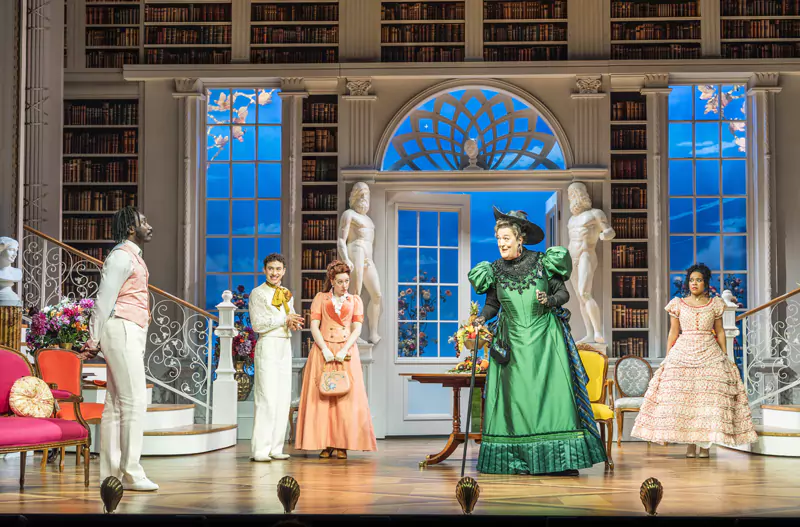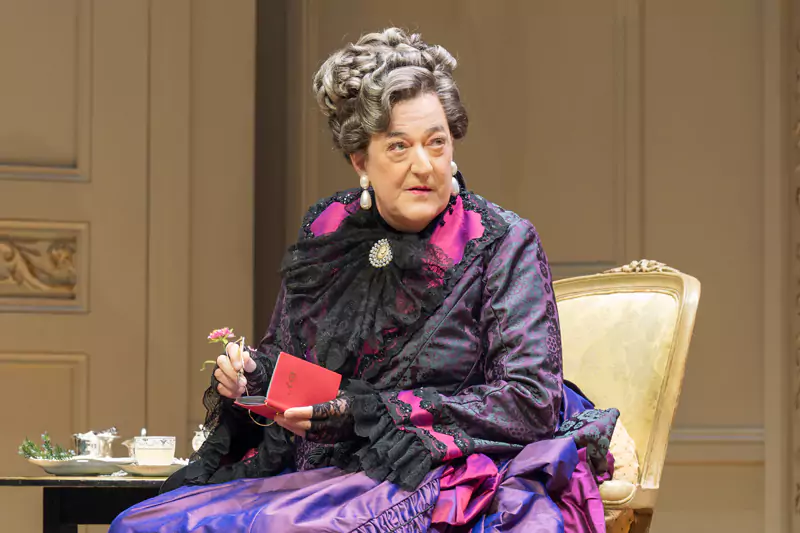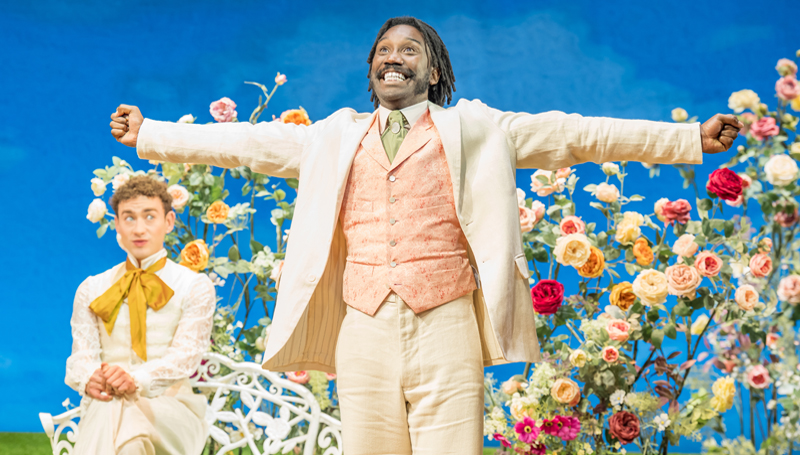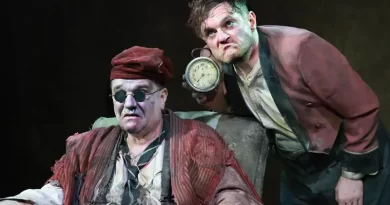“The Importance of Being Earnest” at Noël Coward Theatre
Franco Milazzo in the West End
1 October 2025
★★★☆☆
Fresh from dismembering Romans for the RSC in Titus Andronicus at Hampstead Theatre, Max Webster now invites us to nibble muffins at the Noël Coward Theatre. His production of The Importance of Being Earnest, first seen at the National Theatre last year, now transfers to the West End with a new cast. If last week was a banquet of gore, this week is afternoon tea – with rather too much icing sugar dusted over the cracks.

Stephen Fry (foreground) as Lady Bracknell.
Photo credit: Marc Brenner.
Oscar Wilde’s 1895 comedy The Importance of Being Earnest has been staged so often it risks becoming its own parody, yet Webster mounts it with all the trimmings: Rae Smith’s lavish designs, gowns that rustle like small symphonies, and drawing rooms as polished as the bons mots flying across them. The laughter is plentiful. But, as with many productions of Earnest, the question remains: do we want our Wilde as a museum piece, or might his satire of hypocrisy benefit from a more modern irreverence? The 19th century was scandalized by teacakes and muffins; our own age demands something with sharper teeth.
Still, this is an evening not without triumphs. Nathan Stewart-Jarrett’s Jack Worthing is a marvel of timing and contained outrage. His moral posturing is undercut by sly vulnerability, and when he rails against society’s rules, one sees a man genuinely caught between social masks and personal desire. Kitty Hawthorne’s Gwendolen Fairfax matches him beat for beat, luminous and commanding, her every line tipped with assurance. Together they form the backbone of this production: sharp, sophisticated, and endlessly watchable.
Less successful is Olly Alexander’s Algernon Moncrieff, who seems curiously hesitant in his opening scenes. Alexander takes over from Ncuti Gatwa and it is hard not to make a comparison, especially considering that Gatwa is playing nightly in Born with Teeth at the adjacent Wyndham’s Theatre. Whereas Gatwa wore this role at the NT like a bespoke velvet glove, Alexander wriggles his way into it scene by scene. (If anything, the singer’s appearance here is the reverse of his Eurovision experience where he started off with a dazzling riot of disco pop and ended up somewhat deflated by the dreaded nul points from the public vote.) As one of literature’s ultimate anti-heroes, Algernon should breeze in with instant effervescence and devilish charm; instead, his sparkle emerges only belatedly, leaving the first act flatter than it ought to be. By the second half, Alexander finds a rhythm, but in a role requiring relentless charisma, the delayed ignition feels costly.

Stephen Fry as Lady Bracknell.
Photo credit: Marc Brenner.
Stephen Fry’s Lady Bracknell, meanwhile, is exactly what one imagines it will be: steady, witty, and steeped in gravitas. The gags and harrumphs land with the expected precision, yet therein lies the rub. Fry is such an obvious choice for the role that he cannot surprise us. Bracknell is meant to be formidable, yes, but also unpredictable. Instead we get the Rolls-Royce of performances: impeccably engineered, but unsurprising in every curve.
Webster directs with verve, and there are moments when his production really sings. The garden scene, awash with pastel hues, feels almost cinematic in its sweep. Yet even with the occasional anachronistic nod to recent chart hits (we blame Bridgerton), it cleaves too close to the original to really take off. Fidelity is for marriages not drama, and any director should feel free to update, trim, or go the full Titus Andronicus in search of the play’s inner truth. Wilde’s brilliance lay in his ability to expose hypocrisy through ridicule; in today’s age of social media facades and public shamings, there is ample room for a re-energized Earnest that feels less like a Victorian parlour game and more like a contemporary commentary on our own double lives.
For all its polish, this staging still leaves one longing for that bite. Wilde remains funny, but comedy thrives on risk, and here the risks are too carefully managed. Webster’s double-bill month (with its bloodletting at Hampstead and Bunburying in the West End) reminds us of the director’s approach to reviving older works and the breadth of his range. But the true importance of being Earnest lies not in repeating Wilde’s words with elegance, but in ensuring they sting as much now as they did in 1895. On that front, this production succeeds only in part.









